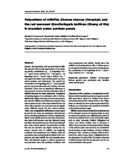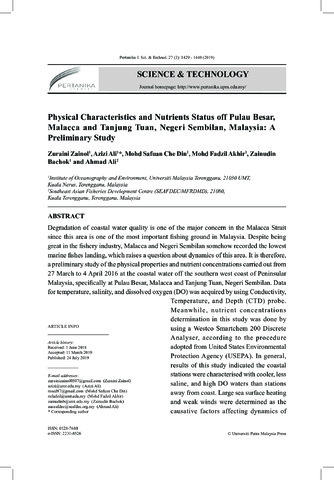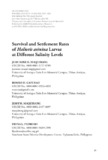| dc.contributor.author | Munoz, Rodrigo C. | |
| dc.contributor.author | Calderon, Reynan P. | |
| dc.contributor.author | Flores, Rudy C. | |
| dc.contributor.author | Masangcap, Sisenando C. | |
| dc.contributor.author | Angeles, Jayson P. | |
| dc.contributor.editor | Romana-Eguia, Maria Rowena R. | |
| dc.contributor.editor | Parado-Estepa, Fe D. | |
| dc.contributor.editor | Salayo, Nerissa D. | |
| dc.contributor.editor | Lebata-Ramos, Ma. Junemie Hazel | |
| dc.date.accessioned | 2016-01-20T07:39:46Z | |
| dc.date.available | 2016-01-20T07:39:46Z | |
| dc.date.issued | 2015 | |
| dc.identifier.citation | Munoz, R. C., Calderon, R. P., Flores, R. C., Masangcap, S. C., Angeles, J. P., &Colentava, M. (2015). Utilization of sensors and SMS technology to remotely maintain the level of dissolved oxygen, salinity and temperature of fishponds. In M. R. R. Romana-Eguia, F. D. Parado-Estepa, N. D. Salayo, &M. J. H. Lebata-Ramos (Eds.), Resource Enhancement and Sustainable Aquaculture Practices in Southeast Asia: Challenges in Responsible Production of Aquatic Species: Proceedings of the International Workshop on Resource Enhancement and Sustainable Aquaculture Practices in Southeast Asia 2014 (RESA) (pp. 243-249). Tigbauan, Iloilo, Philippines: Aquaculture Department, Southeast Asian Fisheries Development Center. | en |
| dc.identifier.isbn | 9789719931041 | |
| dc.identifier.uri | http://hdl.handle.net/10862/2780 | |
| dc.description.abstract | Due to the occurrence of fish kills in various fish producing areas in our country, millions of pesos and opportunities for the Filipino people had been put into waste. Bataan Peninsula State University (BPSU) collaborated with the Central Luzon Association of Small-scale Aquaculture to devise strategies to address the said problem and prevent further losses.
More often than not, a fish kill can be attributed to the low level of dissolved oxygen (DO) in the water, decrease or increase in salinity and sudden increase in temperature, which usually occur after heavy rainfall, flooding or high tide, or high levels of ammonia due to decomposing organic matter and high temperature during summer.
For these reasons, BPSU researchers tested the use of radio frequencies and installed sensors in different areas of the fishpond at various depths to remotely monitor the levels of DO, salinity and temperature of the water. Once these reach critical levels, the installed system which comes with a specific program, will send an alarm through radio frequencies via Short Messaging Services (SMS) technology on the cellular/mobile phone of the caretaker or the fishpond operator. Upon receiving the alarm, caretakers were able to adjust the levels of dissolved oxygen, salinity and temperature of the water by remotely switching on the air compressor or the electric water pump using their cellular/ mobile phone, thus preventing losses due to fish kills. | en |
| dc.language.iso | en | en |
| dc.publisher | Aquaculture Department, Southeast Asian Fisheries Development Center | en |
| dc.subject | Fish kill | en |
| dc.subject | Dissolved-oxygen (DO) | en |
| dc.subject | Salinity | en |
| dc.subject | Radio frequency | en |
| dc.subject | Sensors | en |
| dc.subject | Philippines | en |
| dc.title | Utilization of sensors and SMS technology to remotely maintain the level of dissolved oxygen, salinity and temperature of fishponds | en |
| dc.type | Conference paper | en |
| dc.citation.spage | 243 | |
| dc.citation.epage | 249 | |
| dc.subject.asfa | fish kill | en |
| dc.subject.asfa | salinity | en |
| dc.subject.asfa | sensors | en |
| dc.subject.asfa | telemetry | en |
| dc.subject.asfa | organic matter | en |
| dc.subject.asfa | pond culture | en |
| dc.subject.asfa | water temperature | en |
| dc.subject.asfa | monitoring systems | en |
| dc.subject.asfa | fish culture | en |
| dc.subject.asfa | dissolved oxygen | en |
| dc.subject.asfa | fish ponds | en |
| dc.citation.conferenceTitle | Resource Enhancement and Sustainable Aquaculture Practices in Southeast Asia: Challenges in Responsible Production of Aquatic Species: Proceedings of the International Workshop on Resource Enhancement and Sustainable Aquaculture Practices in Southeast Asia 2014 (RESA) | en |



